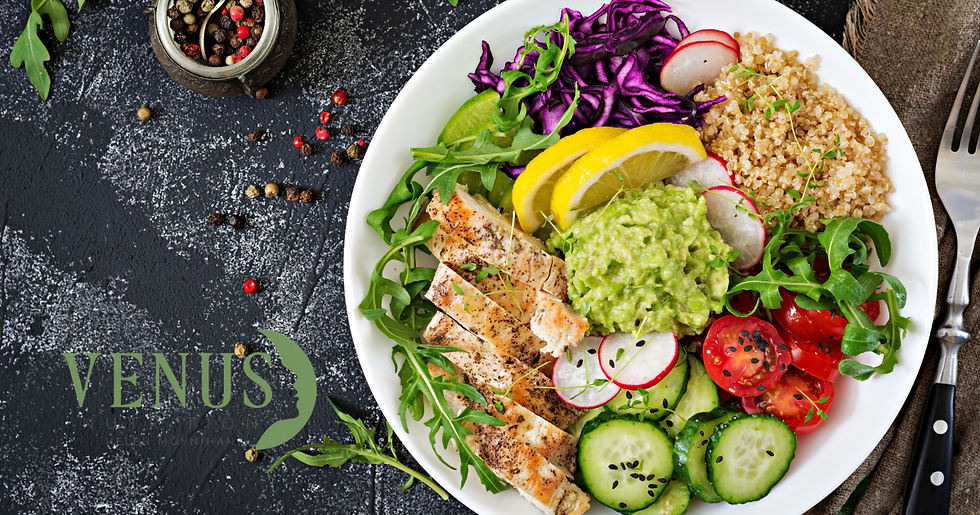How to support your immune system
- Mar 19, 2020
- 3 min read
Updated: Apr 29, 2024
How to support your immune system.
Eat a whole food, nutrient-dense diet. Our immune system relies on nutrient-dense whole foods to function well. Death from infections in the developing world is often not due to the infection itself but the body’s inability to fight it because of nutrient deficiencies.
Cut out sugar and refined starches. Now has never been a better time for a sugar and junk food detox. Studies have shown that refined sugars can suppress your immune system for hours after ingesting. Limiting starch and sugar will help your immune system function better and your overall health improves.
Ensure adequate protein intake. While most people eat adequate amounts of protein, some do not such as the elderly and vegan populations. Protein is critical for immune function and protein malnutrition is a big risk factor for death from infections. Eat approximately 1 gram/kg of body weight per day. Plant-based proteins (legumes, nuts/seeds) are adequate if consumed in enough quantity. Try tofu and tempeh from soy for the highest vegetable protein concentrations.
Add garlic, onions, ginger, and lots of spices (oregano, turmeric, rosemary) to your meals. Add these to your soups and vegetable dishes, as well as bean dips and sauces. Garlic and onions offer wide spectrum antimicrobial properties.
Eat multiple servings of colourful fruits and vegetables high in vitamins C, A, and phytonutrients that support the immune system. Choose more leafy greens, cruciferous vegetables (broccoli, Brussels sprouts, and cauliflower), peppers, sweet potatoes and squashes. Aim for 2 servings of fruits and 8 or more servings of vegetables per day! A serving is half a cup.
Eat fermented foods to support your microbiome and immunity. Eat sauerkraut, kimchi, natto, miso, tempeh, unsweetened yogurt, kefir. They also keep well.
Drink plenty of fluids, especially warmer fluids. Consuming adequate fluids supports all your bodies’ functions including the immune system. Drink herbal teas like ginger and turmeric tea. Keep a bottle of water with you at all times. Avoid concentrated fruit juices and sweetened beverages, as the sugar content is harmful for the immune system.
Get sufficient sleep! We all know sleep restores and heals the body. Without adequate sleep, optimal immune function is next to impossible! Get in a better rhythm and head to bed earlier. Aim for seven to eight hours a night. Incorporate relaxation techniques throughout the day to help with stress and allowing the mind to rest.
Get regular exercise. Mild to moderate exercise (for approximately 30-45 minutes) helps boost the immune system. Avoid overexertion such as training for endurance events when you are feeling run down. This will lower your immune defences. If you are able to exercise outside in less populated areas, great. If not find workouts and yoga classes online.
Practice meditation and yoga. Increased levels of stress increase susceptibility to viral infections. In one study volunteers had cold viruses injected into their nasal passages. Only the ones who scored high on the stress questionnaire succumbed. Now is the time to learn meditation, do yoga, take hot baths, do deep breathing, practice home massage with your loved ones.
How to Supplement for Immune Function
Let’s start with an overview of the vitamins, minerals, and herbs you need and why they are important.
Vitamin D3: Adequate vitamin D status is critical for optimal immune function and this often cannot be achieved without supplementation during the winter months. Studies have shown that people with vitamin D deficiency are 11 times more likely to get a cold or flu, while supplementing with vitamin D can reduce colds and flu by 42%. It is best to get your levels of 25-OH vitamin D checked for accurate dosing.
Buffered Vitamin C: The role of vitamin C in supporting the immune system has long been known. Take 500-1,000mg throughout the day with meals and snacks.
Zinc citrate: You can take an additional supplement or consume more foods high in this powerful immune-supporting nutrient. Seafood—especially oysters—red meat, and pumpkin seeds are the best food sources. Take 30 mg per day.
Probiotics: A healthy gut flora supports a healthy gut, a major barrier against pathogens and integral to the immune system. Look for brands that offer several species of good bacteria and contain at least 5-10 billion organisms per capsule.
1-3, 1-6 Beta Glucans: Research has shown that these compounds up-regulate the function of the innate immune system. This part of your immune system is the first line of defence against viruses and bacteria. It helps your white blood cells bind to and kill viruses and bacteria. Note:If you have an autoimmune disease you should not take this.
Mushroom Extracts such as reishi, maitake, shiitake, turkey tail and cordyceps: These provide immune-supporting properties. Cooking with medicinal mushrooms like shiitake is also helpful.
It is not necessary to take all of these. Just starting with a multivitamin, vitamin D3, vitamin C and zinc is a great start.
Note: This article is not intended to provide medical advice and any changes should be done in consultation with your healthcare provider.




Comments